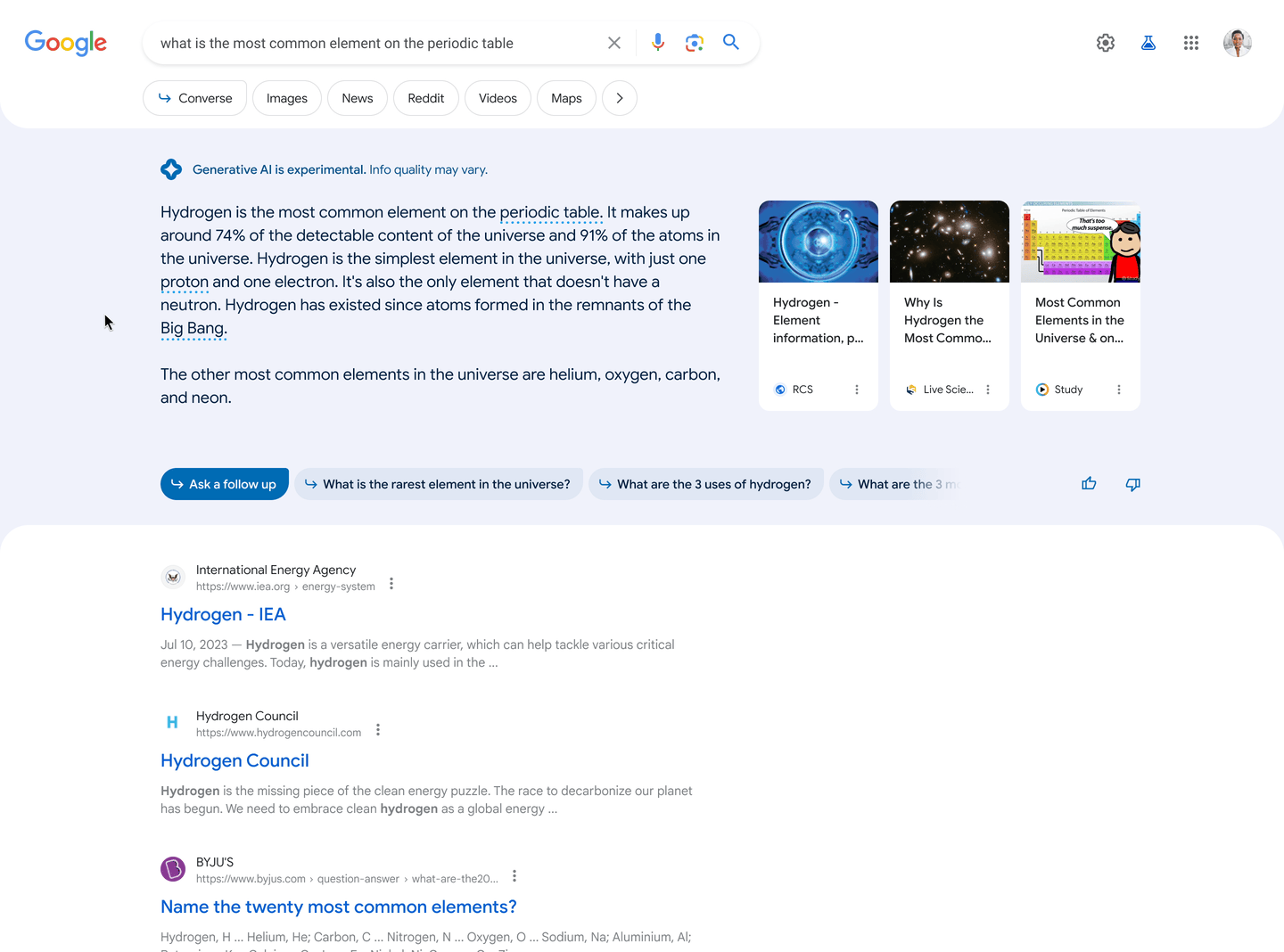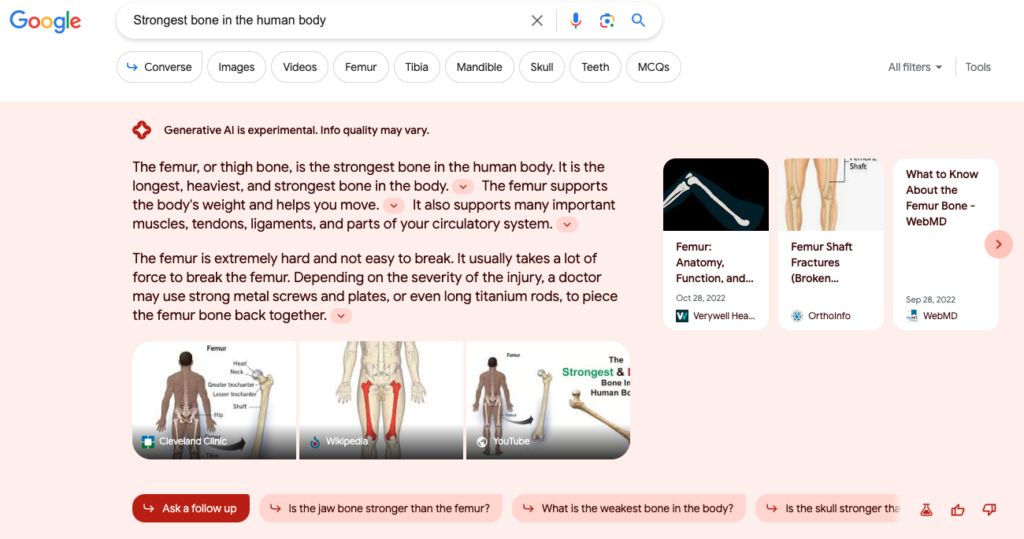The rapid evolution of artificial intelligence (AI) has captured significant attention and search engine optimization (SEO) finds itself at the heart of the dialogue.
As AI becomes a fundamental part of online search mechanisms, those of us in the field are left pondering key questions: How will search engines like Google adapt to use AI? Will AI make SEO obsolete? And is there validity to the predictions of an impending “SEO Apocalypse” as some industry experts have posited?
It’s tough to nail down every twist and turn AI will bring to the search world. But, by examining how AI’s shaking things up right now, we can get a pretty good feel for where things might be headed, and how to gear up for it.
How has AI Impacted SEO?
While tools like ChatGPT have put AI into the spotlight recently, Google and other search engines have been harnessing the power of AI for years.
Search engines have heavily incorporated AI into their frameworks to enhance the search experience for users and to deliver more relevant and personalized results.
Here are just a few ways Google uses AI.
RankBrain: RankBrain, which Google introduced in 2015, is an AI system that helps process search queries, particularly new ones that haven’t been searched before. It interprets user queries and translates them into concepts to find the best possible results, even if the exact words aren’t present in the search index.
Personalization: AI analyzes user behavior, search history, and preferences to deliver tailored results. For instance, if you frequently read articles about astronomy, you might receive space-related content higher up in your search results than someone who doesn’t.
Natural Language Processing (NLP): AI helps search engines understand human language as it’s naturally spoken or written. This is especially important for voice searches where people tend to use conversational language. Google’s BERT (Bidirectional Encoder Representations from Transformers) is a prime example of using NLP to understand the context of words in a query.
Image and Video Search: Google uses AI to analyze and interpret the content of images and videos. This makes image searches more accurate and allows users to search for specific elements within videos.
Predictive Search: Features like Google’s Autocomplete are powered by AI. As users type into the search bar, AI predicts and suggests possible queries based on what’s being typed and what’s popular.
Content Quality Evaluation: AI helps Google differentiate between high-quality content and content that’s spammy or irrelevant. This ensures that users receive the best, most authoritative results for their queries.
User Experience Metrics: AI evaluates various signals related to user experience, such as click-through rates, bounce rates, and session durations. This helps the search engine understand if users are finding the results useful.
Identifying Patterns and Abuses: AI helps detect black-hat SEO tactics, spam, and any other malicious web activity. This ensures that such sites are penalized or de-ranked.
Interactive Features: The integration of AI allows Google to offer features like the “People also ask” box, which provides related questions and answers that users might be interested in.
How is AI Currently Affecting SEO?
It’s important to recognize that AI has been progressively transforming search engines for years. It’s been enhancing their intuitiveness, accuracy, and user focus. Despite the notable advancements we’ve witnessed recently, what we are experiencing now is likely an extension of an ongoing evolution rather than a complete overhaul.
Here are some of the more interesting AI integrations we are seeing now.
Google’s New Search Generative Experience (SGE)
SGE introduces generative AI features to Google Search. This is probably the feature on the forefront of most people’s minds when considering the impact of AI on search right now, and probably for good reason. It’s currently in beta via Search Labs for US users (English), but there’s a strong possibility Google will soon deploy these AI-enhanced search functionalities more broadly.
In our tests, the Beta version of Google Labs’ SGE integrates AI features in over half of all search results. This substantial shift could divert significant traffic and focus away from conventional search results.

Bard is a conversational generative artificial intelligence chatbot developed by Google (Google’s version of ChatGPT). While this is not directly part of Google Search, many believe that tools like this will take market share away from Google in the future as people turn to these “conversational AI” tools for basic questions and feedback.
Microsoft Bing AI
Bing’s search engine also has generative AI chat functionalities. Given that both ChatGPT and Bing Chat leverage OpenAI’s language models, their generated outputs will tend to be alike.
How Will AI Impact SEO in the Future?
It’s always worth remembering that search engines like Google have a primary objective: delivering the most relevant and optimal results to their users’ queries. Whether it’s the perfect answer to a question, the ideal product for a specific need, or the most effective solution to a challenge, their success hinges on how accurately they meet these user needs. The better the results are, the more we, as users, are inclined to keep using their platform. And, of course, the more users they have actively searching, the higher their advertising revenue climbs.
In years past, SEO was about understanding the algorithmic patterns of search engines and optimizing content to rank higher. Over time, as these algorithms have become smarter, the nature of SEO has shifted from mere keyword usage to creating quality, relevant content that provides a great user experience.
With that perspective, if we aspire to secure higher search rankings, our strategy should focus on delivering superior content, exceptional service, and an unparalleled user experience.
Yes, Google and other search engines are including more AI and language models into their search results. However, it’s crucial to recognize that Google still relies on content providers and websites. These new search results extract information from various online sources and come with comprehensive citations. They aren’t genuinely creating information from scratch. For transparency and accountability, they must indicate the sources of this data and information.

A growing strategy we’ve identified emphasizes the importance of EEAT (Experience, Expertise, Authoritativeness, and Trustworthiness) signals. Strengthening these signals can increase Google’s trust in and likelihood of sourcing from your content when generating these SGE results.
Will AI Make SEO Obsolete?
There are many aspects of SEO that have already seen dramatic changes in recent months. Content creation as it relates to SEO is probably one of the most noteworthy.
The popularity of AI-driven platforms, such as ChatGPT and Jasper, has introduced the capability for machines to generate content that generally reads pretty well. This brings us to a pivotal question: Is AI-generated content good for SEO?
While search engines like Google haven’t provided a definitive stance on this, they’ve consistently emphasized the importance of content quality over its origin. Interestingly, there have been instances where websites heavily leveraging AI-generated content have witnessed significant surges in traffic. However, it’s important to note that while AI can craft grammatically sound content, the nuances of human originality, emotion, and authenticity remain unparalleled.
And it’s not just content but almost all areas of SEO that are being impacted by AI. From AI-generated images, videos, and other visuals, to AI tools writing and optimizing website code.
Artificial Intelligence, with its inherent ability to process and interpret vast amounts of data at unprecedented speeds, offers a transformative approach to SEO. By analyzing large datasets, AI can identify patterns, trends, and anomalies that might be invisible to the human eye. This is especially valuable in the world of SEO, where understanding the nuances can make a substantial difference in a website’s performance.
For instance, AI can help pinpoint which specific keywords are driving the most traffic and discern between those that just generate clicks and those that result in meaningful user engagement or conversions. It can analyze user behavior on a site and identify potential areas of improvement from page loading times to the efficacy of call-to-action buttons.
AI-based insights provide a prioritized roadmap for SEO. Instead of sifting through endless spreadsheets or reports, SEO professionals can immediately focus on areas that promise the maximum ROI. This not only saves time but also ensures efforts are directed towards initiatives that drive the most impact.
With the dynamic nature of search algorithms and user behavior, what worked yesterday might not work today. AI’s adaptive learning can predict shifts in the digital landscape, allowing SEO strategies to remain agile and proactive rather than reactive.
While AI will automate many aspects of SEO, the art of understanding human behavior, building relationships through content, and crafting a compelling brand narrative remains inherently human.
The need for good SEO has never been higher, and my prediction is that the need for SEO expertise will only grow as AI becomes more integrated into search. Instead of making SEO obsolete, AI will refine it, eliminate tedious tasks, and allow SEO professionals to focus on strategy and creativity.
Curious about SEO or the potential impact of AI on your business? Let’s chat. Schedule a session with our experts to delve into your specific needs.









